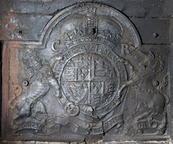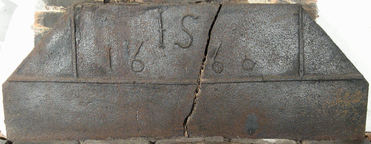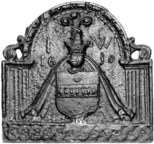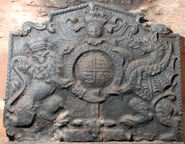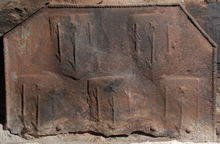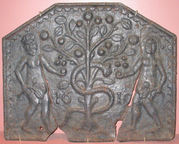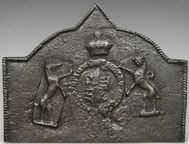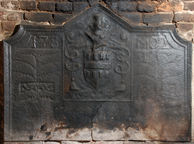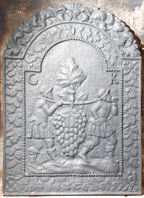-
350
Description: Arched rectangular shape; cavetto edging; armorial; Stuart English royal arms within a circular garter; crown, motto and supporters (crowned lion and unicorn); initials separated by crown.
Notes: An early casting of a widely copied fireback. A later copy with an inserted, probably spurious, date is no. 1303. Inferior copies of this fireback were advertised in Kings Worthy Foundry's (Winchester) catalogue in the mid-20th century.
Copies of this fireback are known.
Inscription: C R / HONI SOIT QVI MAL Y PENSE / DIEU ET MON DROIT
Arms: English Stuart royal
- Decoration tags:
- rectangular with round arch (shape)
- cavetto (edging)
- whole carved pattern
- armorial
- royal
- text
Manufactured: in the mid-17th century in England.
Current location: Knole, Sevenoaks, Kent, England.
(part of the National Trust museum group)
- Attached to series:
- Carolean royal armorial firebacks
- Stuart royal armorial firebacks
-
690
Description: Canted rectangle; plain edges; broad horizontal fillet dividing the plate in two just above the side angles, with vertical fillets to top corners enclosing date and initials.
Notes: Uncharacteristically crude for the period.
Inscription: IS / 16 60
- Decoration tags:
- rectangular with canted top corners (shape)
- none (edging)
- simple stamps
- individual letters
- individual numbers
- text
Manufactured: in 1660 in the Weald area of England.
Current location: Smallhythe Place, Small Hythe Road, Tenterden, Kent, England.
Museum number: 1117951 (part of the National Trust museum group)
- Attached to series:
- Date & initials firebacks
-
691
Description: Arched rectangle; arch with egg and dart, ovolo edging, resting on rectangle shoulders and sides with triple fillet edging, a single fillet edged panel beneath; bottom panel, guilloche pattern of 12; main panel: shield, helm, crest, coronet and mantling of the Wynter/Wintour family of Lydney, Gloucestershire; the initials above the date, both split by the helm and coronet; on either side of the shield, Ionic pilasters; above the rectangle shoulders, a scrolled bracket each side, supporting the arch.
Notes: Wynter: Sable, a fess ermine, in chief a crescent for difference; crest: out of a ducal coronet, or, a cubit arm in armour erect, proper, garnished of the first, in the gauntlet three ostrich-feathers. The arms are likely to be those of Sir John Wynter, who owned several furnaces in the Forest of Dean. Formerly at Watts House, Bishop's Lydeard, Somerset, and before that at The Priory, Taunton.
Inscription: I W / 16 30
Arms: Winter/Wintour of Lydney, Gloucestershire
- Decoration tags:
- rectangular with round arch (shape)
- ovolo, egg and dart (edging)
- whole carved pattern
- individual letters
- individual numbers
- armorial
- text
Manufactured: in 1630 in the Forest of Dean area of England.
Current location: Horniman Museum, 100 London Road, Forest Hill, London, England.
Museum number: 6.249 (part of the Horniman Museum museum group)
- Attached to series:
- Personal armorial firebacks
-
692
Description: Rectangular with inclined sides, joined by scrolls to a pedimented top; twisted rope edging (top and sides); Garter enclosing the Tudor royal arms, with crowned lion and dragon supporters, helm with chapeau and lion crest, and mantling; rectangular date compartment at base; initials either side of crest.
Notes: The detached pediment is stylistically typical of the late-16th and early-17th centuries. The use of a chapeau or cap of maintenance in place of a crown above the helm is rare in this period. There is an excrescence on the casting over the jaws of the dragon caused by the pouring of the molten metal disturbing the sand mould.
Inscription: E R / Garter motto / 160[?0]
Arms: Tudor royal - Elizabeth I
- Decoration tags:
- rectangular with detached pediment (shape)
- rope (edging)
- whole carved pattern
- individual letters
- individual numbers
- armorial
- royal
- text
Manufactured: in 1600 in England.
Current location: Cothay Manor, Stawley, Somerset, England.
- Attached to series:
- Elizabethan royal armorial firebacks
- Tudor royal armorial firebacks
-
693
Description: Canted rectangle; twisted rope edging (top and sides); a shield repeated five times, each bearing three arrows palewise, points down, with a molet (star) above the middle arrow, two over three.
Notes: Three arrows form the arms of several families, so identification of the arms is not possible without the associated colouring. The star is likely to be a mark of cadency, granted to a third son. Four rivets along the base may relate to earlier repair. The fireback was formerly at Chisenbury Priory, Wiltshire. A variant with three shields (W 740mm x H 480mm) was lot 530 at Brettells auction, Newport, Salop, 1 March 2022 and again as lot 457 on 2 May 2023.
Arms: Not known
- Decoration tags:
- rectangular with canted top corners (shape)
- rope (edging)
- carved stamps
- armorial
Manufactured: in the late-16th to early-17th century in England.
Current location: Cothay Manor, Stawley, Somerset, England.
- Attached to series:
- Personal armorial firebacks
-
697
Description: Canted rectangle; embattled, cavetto moulded edging; central tree with fruit and leaves, a snake, facing right, with a human face in profile entwined, in ‘S’ shape, around the trunk and lower branches; to the left, a naked, bearded male figure holding an apple in his left hand and a branch in his right for modesty; to the right a naked female figure with apple and branch also; the date split either side of the snake and tree trunk.
Notes: Similarities with an armorial in the date, numerals and edging suggest a common pattern-maker.
Copies of this fireback are known.
Inscription: 16 19
- Decoration tags:
- rectangular with canted top corners (shape)
- embattled cavetto (edging)
- whole carved pattern
- pictorial
- biblical
- text
- animals
- humans
- plants
Manufactured: in 1619 in England.
Current location: Stroud District Museum, Stroud, Gloucestershire, England.
Museum number: STGC 2371 (part of the Stroud Museum museum group)
- Attached to series:
- 1619 series
- Old Testament & Apocrypha firebacks
- Adam & Eve firebacks
-
51
Description: Arched rectangular shaped, topped with a triangle; twisted rope edging (top and sides only); inverted Tudor royal shield and Garter, crown above, greyhound and lion supporters (see example at Alfriston Clergy House). Two horizontal planklines.
Notes: A uniquely shaped fireback, the inverted shield and Garter indicate that they formed a separate stamp from the crown; other firebacks with these stamps have the shield and Garter the correct way round. A frequently copied fireback; a larger version has a bottom extension. Inferior copies of this fireback were advertised in Kings Worthy Foundry's (Winchester) catalogue in the mid-20th century.
Copies of this fireback are known.
Inscription: HONE SOVT QUEY MAL Y PENSE
Arms: Tudor royal (prob. Elizabeth I)
- Decoration tags:
- rectangular with round arch and triangle above (shape)
- rope (edging)
- carved stamps
- planklines
- heraldic
- armorial
- royal
Manufactured: in the mid- to late-16th century possibly at Pounsley Furnace, Framfield in the Weald area of England.
Current location: Courtlands, Taunton, Somerset, England.
- Attached to series:
- Pounsley series
- Tudor royal armorial firebacks
- Elizabethan royal greyhound series
-
700
Description: Cavetto-canted rectangle with central pediment; cyma-reversa moulded edging; central pedimented panel, fillet edged, with shield, helm, crest and mantling of the May family; on either side, an incised floral pattern of a stem and six branches, rising from a rectangular, low-relief panel of two images of horsemen; above, the inscription in low relief.
Notes: The arms of May: Gules, a fess between eight billets Or; crest: Out of a ducal coronet Or, a lion’s head gules bezanty; the same armorial stamp appears to have been used on an unnamed iron graveslab in Ticehurst church. The initials are probably those of Susanna May (c1653-1718), heir to Pashley, in Ticehurst, who had married her distant cousin, Sir Robert May, in 1686. The May family had been involved in the iron industry in the 16th and early 17th centuries, but were no longer active a century later. Incised decoration on firebacks is uncommon, the decoration probably having been incised into the pattern board.
Inscription: 17S M02
Arms: May of Pashley, Ticehurst
- Decoration tags:
- rectangular with canted top corners and triangular arch (shape)
- cyma reversa/ogee (edging)
- carved stamps
- whole carved pattern
- armorial
- text
- animals
- humans
Manufactured: in 1702 in the Weald area of England.
Current location: in private hands, Ticehurst, East Sussex, England.
- Attached to series:
- Personal armorial firebacks
-
706
Description: Arched rectangular central panel, with bead edging; pictorial, two men in 17th century dress, on a ground, carrying a huge bunch of grapes slung from a pole between them, behind are vine leaves; the initials located below the top corners; arched rectangular border, fillet edging, containing vine leaves and grapes; above, symmetrical swirling foliage.
Notes: The scene, drawn from the Old Testament, represents Joshua and Caleb carrying the bunch of grapes from the valley of Eshcol in the land of Canaan, back to Moses and the children of Israel (Numbers 13: 23-4); a small number of firebacks bear the initials, GK; it is not known to whom they refer, but dated examples are of 1700.
Copies of this fireback are known.
Inscription: G K
Manufactured: in 1700 in the Siegerland area of Germany.
Current location: Tiverton Castle, Tiverton, Devon, England.
- Attached to series:
- 'Dutch' GK series
- Old Testament & Apocrypha firebacks
- Joshua and Caleb firebacks
-
348
Description: Composite; Arched rectangular shaped, armorial fireback, cavetto edging, with Stuart Royal arms, garter, supporters, crown and motto, and 1662 date above crown; this overlies a rectangular plate, with rope-effect, fillet edging; a pattern of four rosettes surrounding a fleur-de-lys, its stem terminating in a small buckle, is repeated on each side of the central armorial fireback, with the initials above; each rosette is stamped separately.
Notes: A variant, bearing the same date, but the initials, A B, and without the rosettes, is at Norton Manor, Malmesbury, Wiltshire. Copies were advertised in F. Parkin & Sons (Exeter) catalogue in 1967 and 1972.
Copies of this fireback are known.
Inscription: 16 62 / C P / HONI SOIT QVI MAL Y PENSE / DIEV·ET·MON DROIT
Arms: English Stuart royal
- Decoration tags:
- rectangular with round arch (shape)
- fillet (edging)
- carved stamps
- whole carved pattern
- composite
- individual letters
- armorial
- royal
- text
Manufactured: in 1662 possibly in the Forest of Dean area of England.
Current location: Tiverton Castle, Tiverton, Devon, England.
(part of the Colchester & Ipswich Museums Service museum group)
